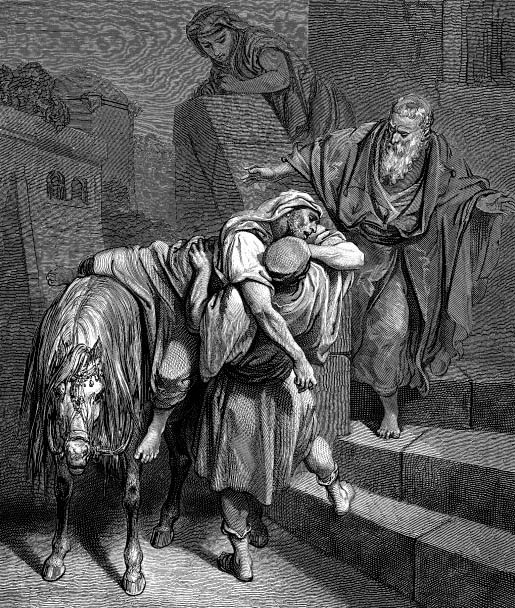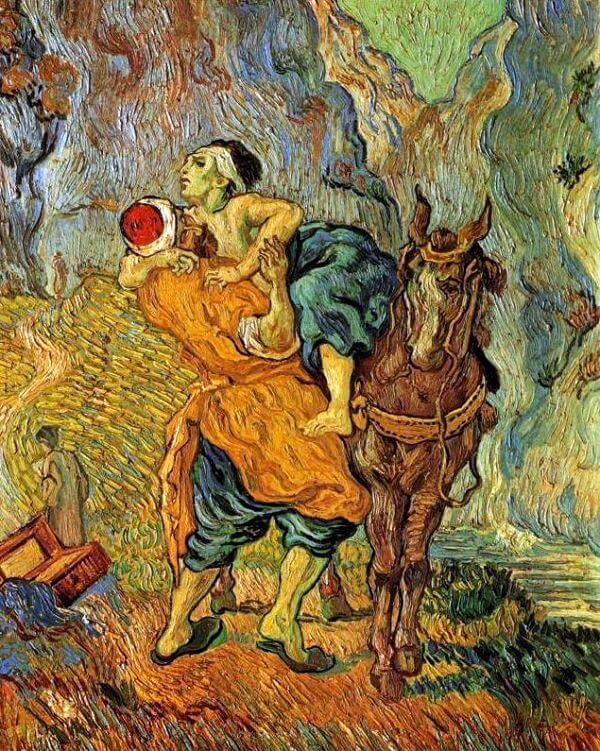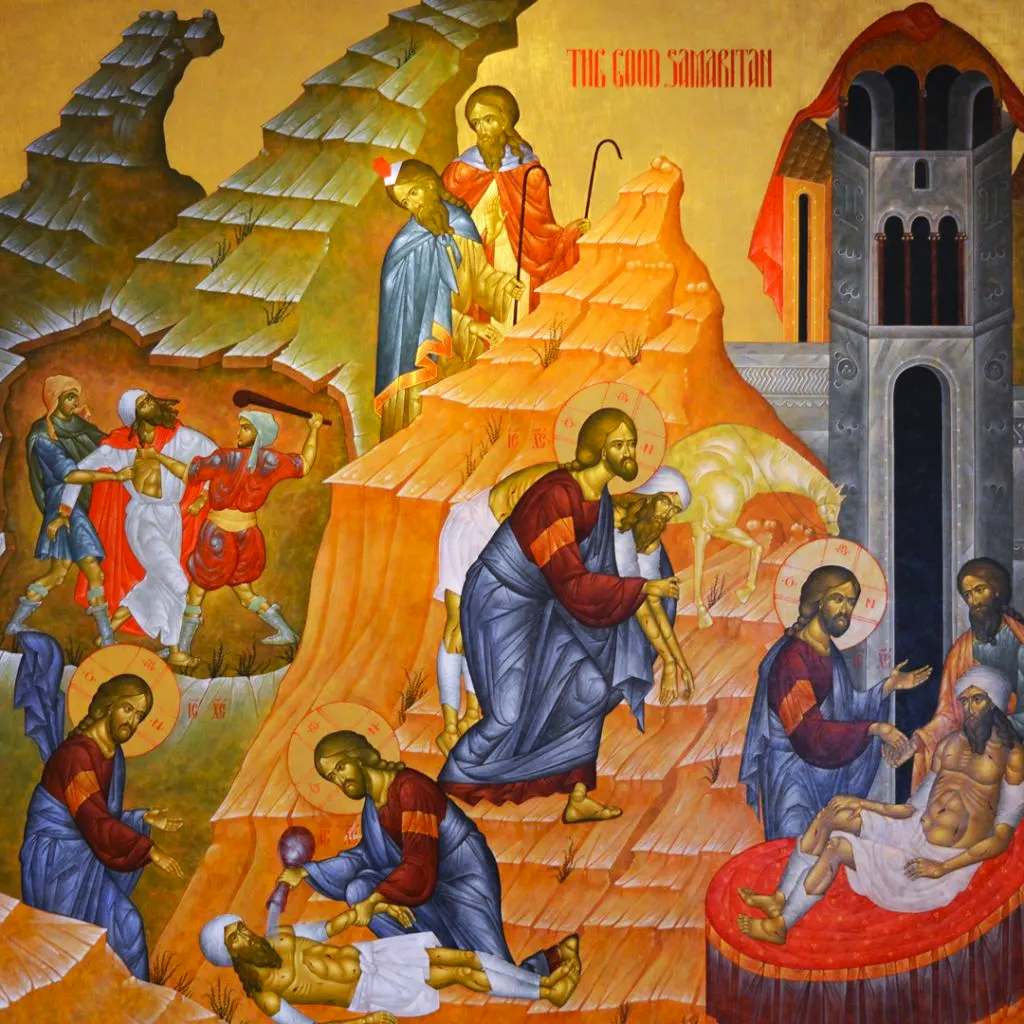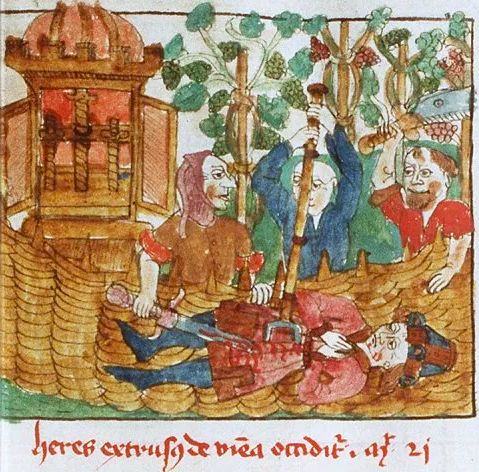Translation of the Epistle for the Twelfth Sunday After Pentecost
Brethren, Such confidence we have through Christ towards God. Not that we are sufficient to think anything of ourselves, as of ourselves: but our sufficiency is from God. Who also hath made us fit ministers of the new testament, not in the letter, but in the spirit: for the letter kills, but the spirit quickens. Now if the ministration of death, engraven with letters upon stones, was glorious, so that the children of Israel could not steadfastly behold the face of Moses, for the glory of his countenance which is made void: how shall not the ministration of the spirit be rather in glory? For if the ministration of condemnation be glory, much more the ministration of justice abounds in glory.
Translation of the Holy Gospel According to Luke
At that time, Jesus said to His disciples: Blessed are the eyes that see the things which you see. For I say to you, that many prophets and kings have desired to see the things that you see, and have not seen them; and to hear the things that you hear, and have not heard them. And behold a certain lawyer stood up, tempting Him, and saying: Master, what must I do to possess eternal life? But He said to him: What is written in the law? how do you read it? He answering, said: Thou shalt love the Lord thy God with thy whole heart, with thy whole soul, and with all thy strength, and with all thy mind, and thy neighbor as thyself, And He said to him: Thou hast answered rightly: this do, and thou shalt live. But he, willing to justify himself, said to Jesus: And who is my neighbor? And Jesus answering, said: A certain man went down from Jerusalem to Jericho, and fell among robbers, who also stripped him, and having wounded him, went away, leaving him half dead. And it chanced that a certain priest went down the same way, and seeing him, passed by. In like manner also a Levite, when he was near the place and saw him, passed by. But a certain Samaritan being on his journey, came near him, and seeing him, was moved with compassion, and going up to him, bound up his wounds, pouring in oil and wine, and setting him upon his own beast, brought him to an inn, and took care of him. And the next day he took out two pence and gave to the host, and said. Take care of him, and whatsoever thou shalt spend over and above, I, at my return, will repay thee. Which of these three, in thine opinion, was neighbor to him that fell among robbers? But he said: He that showed mercy to him. And Jesus said to him: Go and do thou in like manner.
Transcription of Homily
The Saving Words of the Gospel.
Go and do thou in like manner.
In the Name of the Father, and of the Son, and of the Holy Ghost. Amen.
There is a sure interpretive key whenever we’re confronted with one of the parables of Our Lord in that He Himself, Jesus Christ, is the interpretive key for the parables: They’re about Him. And it usually doesn’t take too much imagination to understand that and figure out which one is Our Lord. Well, we can say the same thing about the Beatitudes. Each Beatitude is a certain reflection of His identity; who He is. Of course, He has all of those Beatitudes in their perfection, but each one is a sort of an angle from which we can appreciate His goodness. So, He is not merely a teacher of ethics. These are not morality stories; they are descriptions of Our Lord and Redeemer. But there is also an invitation for us contained therein.
This man is coming down from the Holy City, Jerusalem, the City of Peace, the City of God, the Holy City on Mount Zion. When you read what Irenaeus, and Augustine, and Ambrose, and Origen say about this parable, they all pretty much coincide in their exposition of the symbolic meanings of different terms here. I would say, though, that Augustine is probably the most exhaustive practically; no noun goes without being ascribed a particular symbolic meaning in this. In fact, the next time you’re in the city of Charlotte, Chartres be sure to check out the cathedral there. There’s a beautiful beautiful exposition from the year 1215 of 24 stained glass images; interwoven the Creation and Fall of Adam and this Parable of the Good Samaritan. It is really beautiful.
So ultimately, what the Fathers understood was that this man who has been assaulted by these brigands is not only Adam, He’s each one of us. And that the highwaymen who assault him, and rob him, leave him naked and half dead on the side of the road, are the demons that we expose ourselves to in this fallen world. The wounds that he’s left with are those self-imposed wounds that each one of us has inflicted upon ourselves through our sinful choices.
Jericho is a charged term in Scripture. You may remember in the Old Testament how the Walls of Jericho could not stand up to the army of God, and with the cry on the seventh day, as they did the rotation around the city of Jericho, the walls came tumbling down, and it was claimed for the army of the Lord. Blind Bartimaeus was waiting outside Jericho for the coming of Christ, and he not only received the gift of sight from Our Lord but the Light of Faith. And then you… well, we have this term Samaritan. Samaritan means guardian. So obviously, Our Lord chooses these terms rather carefully.
And who are the Samaritans? Well, they were these outcast half-breeds, half Jewish half Assyrian, and they had some heretical beliefs. So, they were not to be associated with. They were outsiders. A Samaritan was the other. If you remember, in the encounter between Our Lord and the Samaritan woman at the well, in John 5, right she’s rather gobsmacked that a Jew… she goes, “Who are you a Jew who’s going to speak to me and ask for water?” Right? She doesn’t understand how He’s breaching this unwritten rule: Jews don’t speak with Samaritans. Well, Our Lord is the Samaritan in this case. He is the other.
As we hear in the Prologue of John’s Gospel, He came into His own and His own received Him not. So, Christ in His Sacred Humanity, as the Word made flesh, comes to the Jews and they reject Him — many of them anyway. And so, He is really the other; He is the outcast. And so, He sets Himself up as the protagonist and as the antagonist at the same time, depending on your spiritual sensitivity and your degree of theological faith.
So, what does this Samaritan do when he comes upon this man who is on this road? Ammonim, that’s what the Jews called it because it means bloody… bloody place because this was a very dangerous stretch of road, as was kind of a bad neighborhood in the hood. And so, this was understood by the hearers, right? This is not a place you want to go at night or alone. And so, they understood… Also going down from the Mount Zion to one of these lowest, lowest parts, geographically lowest points, in the Holy Land. It was a very, very deep city.
And so, the symbolic meaning is he is on this downward trajectory on this road down from the Holy City to this place of sin. And he’s accosted. He’s attacked. He’s left for dead, and he can do nothing for himself. Sin strips us of our dignity, brings about all sorts of wounds that we perhaps did not reckon with, and it makes us require a savior. And Christ is the Savior. He comes and He binds the man’s wounds. Augustine says this binding of the wounds is the infusion of grace that we receive when we’re forgiven our sins. This infusion of grace is the supernatural assistance we receive through the sacrament to resist temptation.
So, his wounds are bound, he’s strengthened spiritually. He pours on oil and water, symbolizing his baptism, confirmation, His Eucharist, and He puts him on His own beast, it says. So, Our Lord saves us through His flesh. His Sacred Humanity becomes the vehicle of our salvation. It says He put him on His own beast, and He brings him to the inn, which is the Church. And at the end, is the true priest.

Why true priest? Because the other priest and the other Levite, who saw him, were of the Old Testament — they did not have the means of salvation. They were also, as it says, on this downward trek, and so, they had nothing to offer this man. Sometimes, even psychologically, when we have our own disordered attachments, our own sinful proclivities, and if we see them in somebody else, it acts as something of an accusation: We don’t like to see our own sins in somebody else. And so, because it’s an accusation, reminds us of our own weakness. And so, they skirt around him. They’ve got nothing to offer, and they don’t want to look at him. But He brings him to the inn, which is the Church, to the priest, who is the innkeeper, who will take care of him. And then Our Lord shows Himself a true redeemer.
What is a redeemer? A redeemer is one who pays the bond for a servant or a slave who is captive. So bondservant or a slave. So the Redeemer is the one who would pay the price for that man’s freedom. Our Lord is the truest redeemer in every sense, who with the price of His Blood pays for our freedom, and this freedom that only comes from Him.
But then there’s this odd ending to the parable, Go and do likewise. Well, how am I going to do that? I am not the Word made flesh and I don’t have a donkey. I don’t exactly know how I am to do what He did. Well, when we are members of the Church when we have a life of grace, His Mysteries dwell within us. And He is the Head of the Mystical Body, we are the members. And so, we become Christ in time for a world that needs Christ. Each one of us has a mission; a saving mission not just for ourselves, but for our entrusted souls and for the world. And we can go about that in our state in life, through our words, through our deeds, through our penances, and through our prayers. Each one, according to state in life, is responsible for others. Who is my neighbor? Each one of us responsible for our neighbor, and each one of us, entrusted with this glorious task, this most worthy of occupations: Working for the salvation of souls.
In the Name of the Father, and of the Son, the Holy Spirit. Amen.
— Fr. Ermatinger



